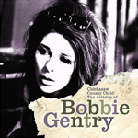July 2004
 Mississippi-born singer and songwriter Bobby Gentry’s exotic good looks
and glamorous appeal probably made her seem out of step with the rest of the pop-music
world in 1967, when she had her first and biggest hit, "Ode to Billie Joe." Like
Glen Campbell, with whom she made an album in 1968, she seemed a little square (an
assumption that the LP with Campbell must have only reinforced). Yet the evidence on Chickasaw
County Child, a compilation of 23 Gentry recordings, suggests that her songwriting was
as innovative and original as that of any of her contemporaries. Mississippi-born singer and songwriter Bobby Gentry’s exotic good looks
and glamorous appeal probably made her seem out of step with the rest of the pop-music
world in 1967, when she had her first and biggest hit, "Ode to Billie Joe." Like
Glen Campbell, with whom she made an album in 1968, she seemed a little square (an
assumption that the LP with Campbell must have only reinforced). Yet the evidence on Chickasaw
County Child, a compilation of 23 Gentry recordings, suggests that her songwriting was
as innovative and original as that of any of her contemporaries.
Although Gentry’s label, Capitol Records, pitched her to a country audience, the musician she had the most in common with at the time was Louisiana singer Tony Joe White. Both songwriters showed the influence of music they grew up with, including blues, country, Southern gospel and rock'n'roll, and both blended them together into something strange and unique. Their songs are filled with regional details, colorful characters, and incidents that capture the rural South at a moment of transition. Gentry’s records may have sounded too slick to people who wanted to hear fuzz guitars, but the arrangements, usually by Jimmie Haskel or Shorty Rogers, were often brilliant and pleasingly eccentric. When "Ode to Billie Joe" entered the charts in July 1967, it had some pretty stiff competition. "All You Need Is Love," "Light My Fire," "Cold Sweat" -- any one of those, certainly, would have caught peoples’ attention. Yet it was Gentry’s song that people talked about most. What made "Ode to Billy Joe" unique was how quiet it was in comparison to other songs on the radio and how complex its story. I can’t imagine anyone, having lived through the '60s or not, who doesn’t know the tune, but here are the opening lines:
Gentry sings the lyrics over her own strummed seventh chords on a nylon-stringed guitar, accompanied by a simple standup bass line and a haunting string arrangement. People have spent the last 37 years focusing on two lines:
While Gentry was no doubt pleased that speculation about those lines helped sell her record (three million copies total), her goal was not merely to relate a scandalous tale. As she noted in a 1992 interview, "…the real message of the song…revolves around the way the family talks about the suicide." Gentry chose her details carefully as she recounted how the narrator's family talks about Billie Joe. Unaware that the narrator was Billie Joe's girlfriend, they make blunt comments about him as they go about their mundane business:
Like a good short story, "Ode to Billy Joe" expands and enlarges each time we return to it or consider its details. The events in the narrative that grab our attention the first time around -- Billie Joe’s death and what he threw off the bridge -- become less important than the interaction of the other characters in the story and the things they say -- or don’t say -- to each other. Near the end of the song, the narrator’s father dies, but, as Gentry pointed out when she wrote about the song later, "…Mama and the girl are unable to recognize their mutual loss or share their grief." Many of the other songs on Chickasaw County Child demonstrate repeatedly that Gentry was an unfairly overlooked songwriter. She had a natural feel for melody in a broad range of styles and an unusually subtle storytelling ability. She never telegraphed the meaning of her stories and rarely fell back on sentimentality. In "Papa, Won’t You Let Me Go To Town With You?" she sings of a father’s neglect and cruelty:
She put the lyrics to a jaunty, upbeat melody that Haskel and Rogers give a clever and quirky jazz/pop arrangement. The song’s glossy veneer plays powerfully against the longing and frustration expressed in the lyrics. Rogers and Perry Botkin, Jr. wrote an arrangement for "Casket Vignette" that cleverly underscores the tale of an undertaker trying to sell an expensive casket to a dead man’s fiancée, who sees through him ("Why are you laughing at me / Don’t you believe in eternity?"). Gentry never again achieved the success she’d had with "Ode to Billy Joe. The arrangements on her records were never cloying or sappy, but they may have led listeners in the '60s to believe her music was too slick. On the contrary, the arrangers, especially Rogers and Haskel, seem to have used her recordings as an opportunity to show how well they could create and sustain the moods her songs evoked. The exceptional mastering on Chickasaw County Child separates the instruments cleanly and enables us to hear their texture and resonance. The strings on "Ode to Billie Joe" have never sounded so vivid or so essential to the overall impact of the song. Gentry made her last recording in 1974, "Another Place, Another Time," a single for the soundtrack that accompanied the movie based on her most famous story. The producers of the film misspelled the title: Ode to Billy Joe. Bobbie Gentry should have enjoyed a long, accolade-filled career. I hope Chickasaw County Child brings her the recognition she deserves. GO BACK TO: |
 Bobbie Gentry - Chickasaw
County Child: The Artistry of Bobbie Gentry
Bobbie Gentry - Chickasaw
County Child: The Artistry of Bobbie Gentry